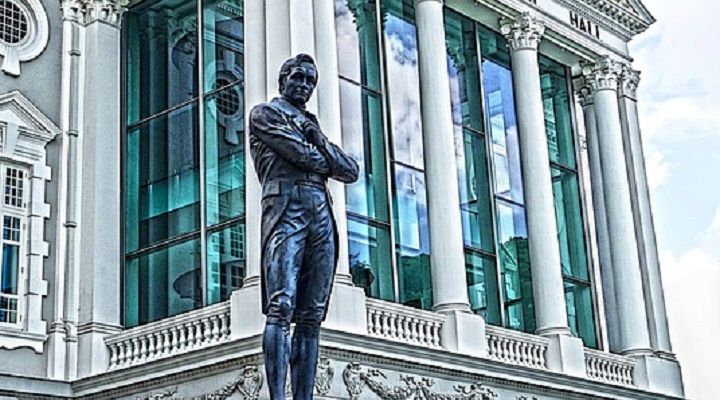If you’ve been active on social media recently, you probably would have noticed the phrase “Singapore bicentennial” marked in bold on the titles of various posts and articles.
The recent budget announcement also included a $1.1 billion Bicentennial Bonus to be given out to Singaporeans to commemorate the bicentennial year.
You probably would have also noticed that while some have termed the bicentennial as a “celebration”, others have ascribed less than favourable descriptions to it.
So what exactly is the bicentennial, and why is the ongoing debate surrounding it significant?
How The Term “Bicentennial” Came About
In essence, 2019 marks the 200th anniversary of Singapore’s founding by the British, including Sir Stamford Raffles who is frequently touted as the “founder of modern Singapore”.
This has galvanised the Singapore Bicentennial Office (SBO) to organise a slew of events including exhibitions, seminars, and even a Bicentennial Edition of the annual Light to Night Festival to commemorate this historical milestone.
While some have deemed these efforts as acceptable given the occasion, others have criticised them as glorifying colonialism and white superiority.
The Good And The Bad
For instance, in a piece for Esquire, Singapore-based writer Neil Humphreys challenged, “How can the subjugation of indigenous people, in any context, be called a celebration? … Praising Raffles acknowledges a white man’s superiority over repressed colonial subjects”.
Others who grew up during the colonial era have also labelled the British as “imperialists” who not only exploited locals and the working class, but also failed in their capacity as leaders and protectors during the Japanese occupation.
Moreover, some individuals have taken issue with the concept that a celebration of the bicentennial could indicate a lack of regard for Singapore’s history before 1819 – that is, before the arrival of Raffles.
For instance, some key events include gem trader Jacques de Coutre’s recognition of Singapore’s strategic location and proposal to the King of Spain to construct a fortress here in the 1630s, as well as Singapore’s already bustling seaport that was established in the 14th century.

All of these transpired well before the arrival of the British, and a bicentennial celebration could thus be perceived as perpetuating the notion that Singapore’s history in the pre-colonial era is non-existent.
There are, however, many who view the bicentennial in a more positive light.
Some have highlighted the positive impact that the British left on Singapore’s education and legal systems, and the way in which our colonial past has helped foster our amicable relations with Britain in the present.
Given SBO’s reassurance that the commemoration “will not shy away from addressing elements in history that may not be always positive”, fears that only a selective—rather than an all-encompassing and unfiltered—version of Singapore’s history will be presented have also been allayed. This official statement has addressed concerns that the bicentennial might adopt a celebratory tone which extols the British’s economic contributions.
But perhaps the most critical contribution that commemorating the bicentennial has delivered is the fervid debate which has arisen surrounding Singapore’s history.
The average Singaporean, armed with bits of information he managed to retain from social studies lessons in primary school, would likely be able to explain the oft-cited narrative on our country’s struggle for independence. Yet, the pre-1965 period generally remains hazy and unfamiliar, let alone fervently debated on or discussed.

Why has only been featured as a footnote in our textbooks, whilst hotels, schools and statues have been established in honour of Sir Stamford Raffles? What of the other officials and figures whose contributions have been obscured by the long shadow cast by Raffles? Does Singapore owe its lingua franca, economic and political systems and, by extension, the foundations of its society, to the British? And finally, should our colonialist past be extricated and embraced, or should it be stored away in the dusty past?
These are questions that the ongoing debate seeks to address, even if they can never truly be answered.
So, the next time you hurry past Boat Quay, perhaps stop in your tracks to consider whether the pristine white statue of Raffles blends in with the immaculate, glass-encased skyscrapers, or if it sticks out like a sore thumb against the backdrop of charcoal grey.
Featured Image Credit: Yahoo Finance






